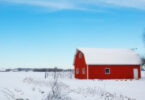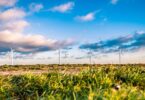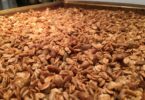GREEN ISLAND, NY — As Eben Bayer sees it, mushrooms and animal meat are very similar.
Animal meat is muscle and fat that grows together as a unit and is eaten as a whole cut. Fungi do the same thing, he said, creating mushrooms that can have a texture similar to meat when eaten.
The root structure of mushrooms, known as mycelium, can do something very similar. Through the unique growth process used by Bayer’s company MyForest Foods, mycelium grows together in a slab of whole tissue. And that slab of mycelium can be sliced, shaped, flavored and cooked — just like animal meat.
“You could think of them as sort of like this fermentable animal, really,” Bayer said. “It’s the closest thing you can get to animal flesh, right? Grown, self-assembled, it’s a whole cut — without having it be a sentient being.”
MyForest Foods has taken the idea of mycelium being a fermentable animal and spun it into a bacon alternative that has been popular everywhere it appears. MyForest’s mycelium bacon has sold out nearly every week for two years at Honest Weight Food Co-Op in Albany, New York, near its home base in Green Island, New York. Since its first retail sale, MyBacon has become available in 10 other natural food stores in New York and Massachusetts, as well as a few local restaurants.
Even though MyForest is a small player right now, the company has plans for much bigger launches in the near future. Its 78,000-square-foot Swersey Silos facility, which the company says is the world’s largest mycelium farm of its kind, is ramping up to begin production of nearly 3 million pounds of mycelium annually. In a year and a half, Bayer said, the high tech mycelium farm will support about $20 million in annual bacon sales.
At the beginning of last month, the facility was half R&D center, half construction zone. Two towering green silos have wood chips inside that are being infused with the fungus needed to grow mycelium.
On one side of the silos is the headquarters of Ecovative, Bayer’s first company, which is dedicated to mycelium packaging, leather and other materials. It’s a large, mostly open area where people work with and test mycelium. A large screen flashes a variety of information, including how much mycelium has been harvested, how much water has been conserved and how many pigs have been saved through making MyBacon.
A look at MyForest Foods’ Swersey Silos mycelium farm facility from Ecovative’s headquarters in Green Island, New York.
Megan Poinski/Food Dive
On the other side of a large paved road and equipment parking area, right next to the silos, are cavernous rooms filled with racks that nearly reach the ceiling. In recent weeks, the construction finished, and each one of those rooms can be filled with trays growing mycelium for MyBacon.
MyForest Foods, previously known as Atlast Food, has attracted attention from both big funders and prominent people in the food business. It’s received $47 million in investments so far, according to Crunchbase, including from former Stonyfield Farm CEO Gary Hirshberg, Robert Downey Jr.’s Footprint Coalition, Whole Foods Market co-founder Walter Robb and Applegate Farms founder Stephen McDonnell.
Time magazine even called MyBacon one of the best inventions of 2022.
“We want folks to enjoy this product because it’s enjoyable — its tasty, delicious, like-bacon experience,” Bayer said. “We’re really trying to communicate this idea that this is not a foreign new space food, but this is something that has been part of our way of living forever. It’s a new way of doing it, but it still brings you the things you enjoy.”
Why bacon?
Mycelium can do almost anything — and nobody knows that better than Bayer and his co-founder Gavin McIntyre.
The duo first became interested in harnessing the abilities of mycelium as students at Renssalaer Polytechnic Institute, where they were challenged by professor Burt Swersey — who the mycelium farm is named after — to “do something meaningful.”
Bayer recalled his childhood on a Vermont farm, where he got up close and personal with mycelium growing around the wood chips near the maple syrup evaporator. For Swersey’s class, he worked on a project to grow mycelium as a compostable substitute for plastic packaging. From that initial project, Bayer and McIntyre formed Ecovative.
About seven years ago, Bayer was learning about the ecological issues caused by factory farming. Plant-based meat was an up-and-coming segment for food, which made Bayer think.
“We’d been developing this technology to capture the essence of a mushroom that you’d find in the forest and grow it in these big sheets or slabs,” Bayer said. “I was like, that could be slabs of mushroom meat.”
Bayer knew that he and McIntyre were going to make mycelium into food, but they needed to figure out how best to do it. They tried growing the mycelium of a variety of popular edible mushrooms — which he said was important because they’re already FDA approved for consumption, and consumers are familiar with them. Some worked better than others. Morels, popular for their distinctive taste, have mycelium that looks like animal fur, Bayer said.
The partners settled on the mycelium of oyster mushrooms. And then all kinds of food experiments followed. They squished the mycelium to make it into carbohydrate-free snacks, somewhat akin to cheese balls. They made chicken breasts. They created fish filets. They made a seafood-free version of clams casino. They made desserts. And they made bacon.
After creating all these prototypes, MyForest hosted several test dinners. Bayer said they talked to participants about what they tasted, and mycelium bacon was the resounding favorite.

Slicing a slab of MyForest Foods’s mycelium.
Courtesy of MyForest Foods
At the same time, Bayer said, the company was looking at the business case for all of the food options, considering how it would scale, what the market looked like and how profitable different items would be. On the business side, bacon also came out on top.
When the partners ran the numbers in 2020, Bayer said, the U.S. bacon market was nearly $6.5 billion — with 60% being premium and organic bacon. Not even 1% of that was plant-based.
“There’s basically no plant-based bacon sold,” he said. “Then we want to try them and we’re like, ‘Oh, I get it. It’s horrible.’”
Not only are consumers willing to pay more for bacon — and MyBacon currently is positioned as a premium product — but a bacon alternative that actually cooks and tastes like the animal version could more easily win more of them over, Bayer said.
MyBacon, which comes in a flat plastic package similar to the way pork bacon is sold, has many similarities to the animal variety. The slices inside look like bacon, though the fat marbling and piece angles are a bit more uniform.
Nick Ruscitto, MyForest Foods’ executive chef and a former proprietor of acclaimed restaurants in Albany, put slices of MyBacon in a frying pan. They slowly sizzled, caramelizing like pork bacon. The air filled with the smells of cooking bacon, and the edges of the pieces became crispy and uneven.
At the end, the pan was not filled with excess oil — Ruscitto said that while coconut oil is added to MyBacon, it’s an amount that is mostly absorbed into the mycelium. (Ruscitto uses rendered MyBacon fat as many chefs use bacon fat, to flavor and fry other dishes.)
The crispy cooked bacon was easy to bite and chew, unlike the more cardboard-like texture some plant-based bacons are known for. Ruscitto said the texture comes from the structure of the mycelium.
MyBacon gets a good reception from consumers, Ruscitto said. MyForest Foods has done pop-up events where people get to try MyBacon in breakfast dishes. But, he said, mycelium bacon also has pleased customers at a restaurant that prides itself on the fine pork custom chosen for its bacon.
“Everybody really likes it,” Ruscitto said.
How the bacon is made
Bayer described Swersey Silos as a sort of magical factory.
“It’s like wood chips enter on one end, and bacon leaves on the other,” he said.
There’s more science and careful calibration of mycelium involved than there is magic. But it is a unique process that borrows techniques used by Ecovative and methods used by mushroom farmers across the world.
The process begins in the actual silos where the wood chips that are used to grow the mycelium are collected. The wood chips are heated and pasteurized, then they’re seeded with mycelium. The chips then go to a pre-treatment room, where the mycelium is exposed to optimal growing conditions, and is able to really take hold of the wood chips.
The mycelium-seeded wood chips then go into MyForest’s mycelium farm. They are poured into metal trays that are 80 feet long. An automated system loads them into a rack in one of the farm’s massive growing chambers.
Once the room is filled with the trays, a camera system is turned on so engineers can keep an eye on the mycelium, though the farm is mostly automated. The door is shut, and the proprietary growth system in the room is turned on.
And 12 days later, the trays are filled with fluffy sheets of mycelium, which look like long white strips of pork belly. Without the special system in the mycelium-growing chambers, each tray would be filled with mushroom caps and stems, not the dense and solid mycelium.
What MyForest has figured out, Bayer said, is how to keep the mycelium from forming a mushroom. After all, he said, mushrooms pop up quickly. A person can walk through the woods and discover mushrooms that weren’t there the day before.

Trays of mycelium-seeded wood chips that will grow into MyForest Foods’ MyBacon are placed on these shelves at the company’s Swersey Silos facility. MyForest uses its AirMycelium growth method to make its bacon analog.
Permission granted by MyForest Foods
MyForest’s growth system is called AirMycelium.
“It’s just the closest to how nature does it,” Bayer said. “The fibers come up into the air, like they’re coming out of the ground in the forest on a dewy day, right? And they feel wind and mist. We just sort of trick them with the wind and the air, rather than forming a mushroom, [to] just keep sort of weaving themselves together.”
The growing chambers are identical to those in a standard mushroom farm, which is by design, Bayer said. In the early days of Ecovative, all of the equipment was custom designed, which he said made it very difficult to scale. By using standard equipment, it’s not just easier for MyForest to expand its own capacity, but it can more easily work with other mushroom growers, too.
Early this year, MyForest entered a partnership with Whitecrest Mushrooms to grow its mycelium. Whitecrest already has similar equipment for its organic mushroom business, and MyForest will ship them the mycelium-infused wood chips. Whitecrest’s mushroom growing rooms are then adjusted to be identical to conditions at MyForest, and after the mycelium is grown, it will be shipped to MyForest in New York.
Bayer said growing mycelium for MyForest is good business for mushroom growers. They can use their existing infrastructure and grow something that sells for a much higher price than mushrooms in a shorter amount of time. It can take six weeks to grow mushrooms, but only 12 days for MyForest’s mycelium.
When the mycelium has grown, it is harvested from the trays and goes to a “smokehouse” facility to be turned into something that looks and tastes like bacon. MyForest currently uses a former meat smokehouse in Albany for drying, flavoring and slicing the MyBacon, but it’s building a larger facility in Saratoga Springs, New York that will be operational next year.
Mycelium hits the big time
Bayer is getting ready for mycelium food to make it big. He said he knows it will, but through 15 years with Ecovative, he’s learned the business definition of patience.
Mycelium, Bayer said, can do practically anything. In addition to food, you can make it into furniture, lamp shades, acoustic tiles and building material.
“Before you know it, you’ve done all this cool stuff, and there’s not any one thing being done perfectly at scale,” Bayer said.
Eventually, Bayer said, MyForest will make many of the interesting food items that have been discussed — jerky, snack food, chicken, fish, scaffolding for cell-based meat growth.
But now, he said, they are concentrating on bacon. “You’ll see some new products coming once we’ve sort of proven out into the market space and proven to ourselves we executed on that.”

A BLT sandwich featuring MyBacon.
Courtesy of MyForest Foods
Bayer, who is a self-described “weird mushroom person,” also doesn’t think MyForest will see much hesitation from consumers to try mycelium. After all, mycelium is everywhere nowadays. It’s becoming a sought-after material for fashion. But it’s also at the center of the “Star Trek: Discovery” series, in which the USS Discovery uses its “spore drive” to jump through the “mycelial network,” connecting the entire universe.
Pop culture aside, Bayer sees practical aspects behind mycelium’s rise — and continued success. It’s easy, inexpensive and quick to grow. Mycelium is highly nutritious and does not require extensive processing. It’s sustainable. It can be used to make a variety of products, from beverages to cheese to meat analogs.
In five or six years, Bayer said he expects that MyForest will produce somewhere around 50 million pounds of mycelium annually. And, he said, as long as people get the chance to taste MyBacon, their appreciation of mycelium will come with it.
“We’re really leaning into owning mycelium,” Bayer said, gesturing to a MyBacon package. “We’re trying to have a little fun with it with folks, and then just kind of draw them into this idea without kind of beating them over the head. The key terms are here. lt’s whole cut, right? You’ve got great taste and texture. There aren’t a lot of ingredients.”








